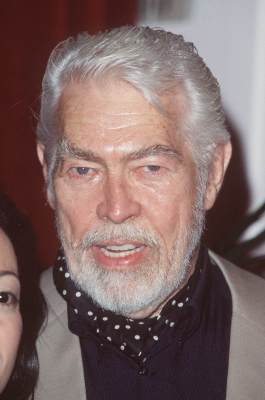|
James Coburn
Scroll down for movie list.
Spouse
'Paula Murad' (22 October 1993 - present)
'Beverly Kelly' (1959 - 1979) (divorced); 1 son, 1 stepdaughter
------------------------------------------------------------------------
Trivia
In 1979, James started suffering from severe rheumatoid arthritis which has at times left him debilitated. In 1998, a holistic healer started him on a dietary supplement, which has resulted in a drastic improvement in his condition.
James has two children - James H. Coburn IV (b. 1961, a sound mixer) and Lisa (b. 1957, a web site designer)
Was a pallbearer at the funeral of actor (and his martial arts instructor) Bruce Lee
Appears on the cover of Paul McCartney's 1973 album 'Band on the Run'.
He co-wrote two songs with Lynsey De Paul, "Melancholy Melon" and "Losin' the Blues for You" that appeared on her album "Tigers and Fireflies".
He had a relationship with Lynsey De Paul.
Daughter Lisa is currently webmaster for genesimmons.com, the official website of Gene Simmons from the rock group Kiss.
Biography from Leonard Maltin's Movie Encyclopedia:
Lean, athletic actor who gained fame for his suave characterizations and action leads, but never quite made it to the front rank of stars. After army service, Coburn studied acting in California and New York and worked on stage and live television before making his film debut as an outlaw in the Randolph Scott Western Ride Lonesome (1959). Another Western role came in Face of a Fugitive (1959), but it was his performance as the knife-throwing Britt in The Magnificent Seven (1960)-surrounded by other "macho" actors-that put him on the map. He didn't have many lines, but his physical presence spoke volumes. Soon he was featured in Hell Is For Heroes (1962), Charade (1963), and The Great Escape (1963, as the Australian Sedgwick). More supporting roles followed in The Americanization of Emily (1964), Major Dundee (1965, directed by Sam Peckinpah), and then, finally, a lead in the crime drama Dead Heat on a Merry-Go-Round (1966), before he achieved his greatest success as super agent Derek Flint (a role that fit him like a glove) in the James Bond spoof Our Man Flint (1966) and the sequel In Like Flint (1967). One of his best performances was as the title character of The President's Analyst (1967, which he also produced), a wicked (and neglected) satire about what happens to the nation's number one shrink when he quits. Candy(1968), Duffy (1969), and Last of the Mobile Hot-Shots (1970) were poor, but many 1970s films offered him interesting opportunities in roles such as an aging rodeo rider in The Honkers (1971), an explosives expert in Sergio Leone's Duck, You Sucker (1972), a producer in the ingenious mystery The Last of Sheila (1973), a participant in a 600-mile horse race in Bite the Bullet (1975), a fight promoter in Hard Times (also 1975), and in the leading roles of two more Peckinpah films: 1973's Pat Garrett and Billy the Kid (as the reluctant lawman Garrett) and 1977's Cross of Iron (as a WW2 corporal).
More formula pictures followed, like Firepower (1979), The Baltimore Bullet (1980), High Risk and Looker (both 1981), but by this time Coburn was suffering from rheumatoid arthritis which severely weakened him. He appeared sporadically, mostly in little-seen films like Martin's Day (1984), Death of a Soldier (1986), and Walking After Midnight (1988). His voice remained familiar to audiences on a flock of TV commercials, while he concentrated on diet, physical therapy, and exercise. He was back in good form in Young Guns II (1990, in a role harkening back to his Pat Garrett days, as an enemy of Billy the Kid) and played a CIA agent in Hudson Hawk (1991), a film that unsuccessfully tried to duplicate the flip-hip attitude of Coburn's own Flint films. Recently, he's been busy again in Sister Act 2, Deadfall (1993), and the film version of Maverick (1994). He also cowrote the story (with his friend Bruce Lee) of an odd movie called The Silent Flute which was released in 1978. |  |










